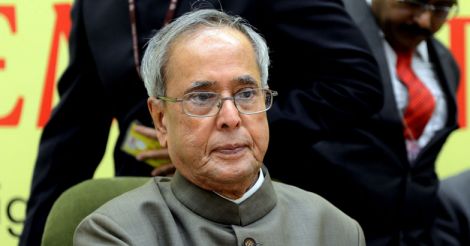The announcement of election schedule and introduction of model code of conduct has meant President Pranab Mukherjee would be spending more time in Delhi than travelling. It is a tradition for Presidents to remain in the national capital once election schedule is announced, travelling out for important bipartisan work. Though the President's actual work starts after the results are declared on May 15, Mukherjee would closely monitor the developments. Further it has become a practice for political parties to send delegations to the President with complaints either against the ruling party or the government about misuse of office.
Mukherjee's office is ensuring that he will not attend any function which has any political overtones. However, he has indicated that he would definitely attend to important events like university convocations, presentation of colours to military units, cultural programmes which would promote India's relations with friendly countries. He will even attend governmental programmes, which are meant for the larger good of the people like health campaigns, educational awareness and social welfare messages. However, the President would not directly launch any government scheme, which can be seen as a potential vote seeking move.
The President would also monitor the activities of state Governors to ensure that they do not get involved in any political work. Mukherjee would like all the Governors to keep their heads above the political waters. Gulsher Ahmed, a Congress politician from Madhya Pradesh was appointed Governor of Himachal Pradesh in June 1993, as the party did not want him to contest the elections. Ahmed, however, was caught in a controversy when he visited his home state in the thick of Assembly elections, where his son was contesting. He was forced to resign. Even though Mukherjee's son is a sitting MP who is seeking re-election, the President would scrupulously stay aloof.
Mukherjee would spend the next two months updating himself on the precedents on government formation, especially if the results on May 15 produce a hung Parliament. Mukherjee, who is known for his elephantine memory for facts and figures, would still like to read the internal files of the Rashtrapati Bhavan on how Presidents decided issues of majority and whom to invite. The Constitution gives the President much leeway in this regard.
The first hung Parliament was thrown up after the 1989 elections, when the Congress became the single largest party, followed by the Janata Dal. The then President R Venkataraman went by the principle of inviting the parties in order of their strength.
However, Congress leader Rajiv Gandhi declined the invitation saying he did not have sufficient numbers. Then V P Singh of Janata Dal was invited, and he formed the government with outside support of the BJP and Left parties. In 1991, the Congress came close to majority, and Venkataraman invited Congress leader P V Narasimha Rao to form the government. Rao formed the government and survived a full term.
When next President shankar Dayal Sharma invited Atal Behari Vajpayee, leader of the largest party after the 1996 elections, there was criticism as Vajpayee did not have the numbers. But Vajpayee accepted the offer, but could not prove his majority. Then Sharma asked Rao, as leader of second lagest party, who declined and finally H D Deve Gowda, leader of the third largest party was invited.
K R Narayanan, who succeeded Sharma in 1998, insisted that Vajpayee as leader of the largest party produce the letters of support from other parties to prove he had a viable majority in the Lok Sabha. In 2004, when Congress emerged as the single largest party, President A P J Abdul Kalam gave Sonia Gandhi first chance, provided she had letters of support. Sonia nominated Manmohan Singh and produced the letters of support.
There are copious notes in Rashtrapati Bhavan files, including opinions of former Chief Justices of India, leading lawyers and even suggestions from ordinary citizens on what the President should do. As the nation gets busy with the election, the President has a lot of work to do.
Tailpiece: Vice-President Hamid Ansari too has limited activities due to elections. However, he will be occupied with the administration of the Rajya Sabha, whose members remain active through their committees, even though the Rajya Sabha itself will not be meeting.









































































































































































































































 President Pranab Mukherjee. File photo
President Pranab Mukherjee. File photo
POST YOUR COMMENTS
In order to prevent misuse of this functionality your IP address is traced
What is your take...?
Your comment is posted successfully
More Comments
You have already approved this comment.
You have already marked this comment as offensive
Your comments will be validated by Manorama.
You have already agreed to this comment
You have already disagreed to this comment
Disclaimer